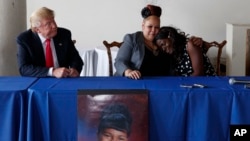Donald Trump was met with tears and gratitude as he sat with African-American supporters Friday, including the mother of a slain young woman who was killed by a man who entered the U.S. illegally.
The back-to-back meetings, held in a ballroom in Northwest Philadelphia, underscored the balancing act the Republican nominee is playing as he tries to expand his support in the race against Democrat Hillary Clinton.
While Trump works to broaden his appeal among more moderate and minority voters, he's also working to maintain his popularity with his core GOP base by pressing his hard-line views on immigration.
At the invite-only roundtable discussion, Trump met with a dozen local business, civic and religious leaders who praised him for coming to "the hood" as part of his outreach efforts.
'My vote is going to count'
Trump was warmly received by the group, including Daphne Goggins, a local Republican official, who wiped away tears as she introduced herself to Trump, saying she's been a Republican most her life, but, "for the first time in my life, I feel like my vote is going to count."
Renee Amoore, a local business leader, assured Trump that he has support in the black community, despite his low standing in public opinion surveys.
"People say, Mr. Trump, that you have no African-American support. We want you to know that you do," she said, adding, "We appreciate you and what you've done, coming to the hood, as people call it. That's a big deal."
But Trump's meeting also highlighted the challenges he faces making inroads with African-Americans and Latinos. Protesters gathered in front of the building where Trump appeared, and a coalition of labor leaders met nearby to denounce Trump's outreach to black voters as disingenuous and insulting.
Ryan Boyer of the Labor District Council said Trump "has no prescription to help inner-city America."
"The best predictor of future behavior is past behavior," said Boyer, speaking at the council's headquarters. "He did nothing for African-Americans in 30 years of public life. We reject his notion that we have nothing to lose by supporting him."
Detroit meeting
Next stop for Trump is Detroit on Saturday, where blacks make up some 83 percent of the population. He's expected to visit a church with a predominantly black congregation while there.
In addition to planning trips to urban centers, Trump has re-vamped his campaign pitch to include a direct appeal to African-Americans and Hispanics, making the case that decades of Democratic policies have failed them. "You live in your poverty, your schools are no good, you have no jobs," he recently argued.
But so far, Trump's outreach has largely fallen flat. Many minority voters have found Trump's dire description of their lives to be condescending -- and African American community leaders have dismissed Trump's message -- delivered largely in front of predominantly white rally audiences -- as more intended to reassure undecided white voters that he's not racist than actually help communities of color.
Public opinion surveys show Clinton polling far ahead of Trump with minority voters.
Immigration stance
Trump also continued to take a hard-line stance on immigration, which he highlighted once again on Friday. The New York billionaire met with Shagla Hightower, whose daughter, Iofemi, was killed along with two friends in a 2007 attack in a Newark, New Jersey school yard.
In an emotional exchange, Shalga Hightower said her daughters' killers "should have never been here" and praised Trump for giving her daughter recognition. "I truly, truly thank you from the bottom of my heart," she said.
Trump has been featuring parents whose children have been killed by people living in the U.S. illegally at his events to try to underscore the risk they pose.
Hightower's story is "a horrible story," Trump said, "but it's a story a lot of people are going through." He added that Clinton "has no clue and doesn't care."




